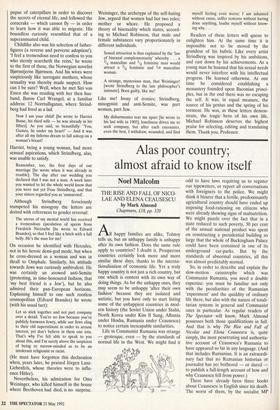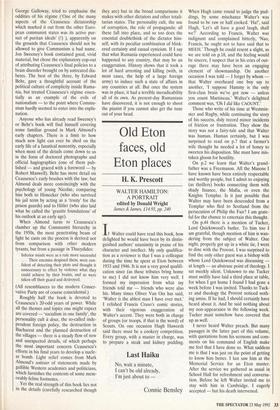Alas poor country; almost afraid to know itself
Noel Malcolm
THE RISE AND FALL OF NICO- LAE AND ELENA CEAUSESCU by Mark Almond Chapmans, f18, pp. 320 A, happy families are alike, Tolstoy tells us, but an unhappy family is unhappy after its own fashion. Does the same rule apply to countries? I doubt it. Prosperous countries certainly look more and more similar these days, thanks to the interna- tionalisation of economic life. Yet a truly happy country is not just a rich country, but one which is content with its own way of doing things. As for the unhappy ones, they may seem to be unhappy 'after their own fashion' because they are isolated and autistic; but you have only to start listing some of the unhappiest countries in mod- ern history (the Soviet Union under Stalin, North Korea under Kim II Sung, Albania under Hoxha, Rumania under Ceausescu) to notice certain inescapable similarities.
Life in Communist Rumania was strange — grotesque, even — by the standards of normal life in the West. We might find it .odd to have laws requiring us to register our typewriters, or report all conversations with foreigners to the police. We might think it bizarre that a fertile, predominantly agricultural country should have ended up imposing food-rationing on citizens who were already showing signs of malnutrition. We might puzzle over the fact that in a state reduced to such poverty, 30 per cent of the annual national product was spent on constructing a presidential building so large that the whole of Buckingham Palace could have been contained in one of its underground car-parks. But by the standards of abnormal countries, all this was almost predictably normal.
So, in order to describe and explain the slow-motion catastrophe which was Communist Rumania, you need a double expertise: you must be familiar not only with the peculiarities of the Rumanian 'experiment' and the quiddity of ordinary life there, but also with the nature of totali- tarian systems in general and Communist ones in particular. As regular readers of The Spectator will know, Mark Almond possesses both those qualifications in full. And that is why The Rise and Fall of Nicolae and Elena Ceausescu is, quite simply, the most penetrating and authorita- tive account of Ceausescu's Rumania to have appeared so far in any language. (And that includes Rumanian. It is an extraordi- nary fact that no Rumanian historian or journalist has yet bothered — or dared to publish a full-length account of how and why Ceausescu fell from power.) There have already been three books about Ceausescu in English since his death. The worst of them, by the socialist M P
George Galloway, tried to emphasise the oddities of his regime ('One of the many aspects of the Ceausescu dictatorship which marked it out from the other Euro- pean communist states was its active pur- suit of puritan ideals' (!) ), apparently on the grounds that Ceausescu should not be allowed to give Communism a bad name. Jon Sweeney's book contained good, vivid material, but chose the explanatory cop-out of attributing Ceausescu's final policies to a brain disorder brought on by untreated dia- betes. The best of the three, by Edward Behr, gave a thoughtful account of the political culture of complicity inside Ruma- nia, but treated Ceausescu's regime essen- tially as an example of the evils of nationalism — to the point where Commu- nism hardly seemed to enter into the expla- nation.
Anyone who has already read Sweeney's or Behr's book will find himself covering some familiar ground in Mark Almond's early chapters. There is a limit to how much new light can ever be shed on the early life of a fanatical nonentity, especially when most of the details come down to us in the form of doctored photographs and official hagiographies (one of them pub- lished — and graced with a foreword — by Robert Maxwell). Behr has more detail on Ceausescu's early brushes with the law; but Almond deals more convincingly with the psychology of young Nicolae, comparing him both to Honecker (who also survived his jail term by acting as a 'trusty' for the prison guards) and to Hitler (who also laid what he called the 'granite foundations' of his outlook at an early age).
When Almond turns to Ceausescu's clamber up the Communist hierarchy in the 1950s, the most penetrating beam of light he casts on the process is derived not from comparison with other modern tyrants, but from a passage in Thucydides:
Inferior minds were as a rule more successful . .. Their enemies despised them, were con-
fident of detecting their plots and thought it unnecessary to effect by violence what they could achieve by their brains, and so were taken off their guard and destroyed.
(All resemblances to the modern Conser- vative Party are of course coincidental.)
Roughly half the book is devoted to Ceausescu's 20-odd years of power. While all the themes and topics one might expect are covered — 'socialism in one family', the personality cult a deux, the so-called inde- pendent foreign policy, the destruction in Bucharest and the planned destruction of the villages — there is a steady flow of new and unexpected details, of which perhaps the most important concern Ceausescu's efforts in his final years to develop a nucle- ar bomb. Light relief comes from Mark Almond's sottisier of statements made by gullible Western academics and politicians, which furnishes the contents of some mem- orably feline footnotes.
Yet the real strength of this book lies not in the details (carefully researched though
they are) but in the broad comparisons it makes with other dictators and other totali- tarian states. The personality cult, the use of corruption, the role of propaganda: all these fall into place, and so too does the essential doublethink of the dictator him- self, with its peculiar combination of blink- ered certainty and casual cynicism. If I say that what Rumania experienced could have happened to any country, that may be an exaggeration. History shows that it took a lot of hard arresting and killing (with, in most cases, the help of a large foreign army) to induce such a state of affairs in any countries at all. But once the system was in place, it had a terrible ineradicability all of its own. As present-day Rumanians have discovered, it is not enough to shoot the pianist if you cannot also get the tune out of your head.



































































 Previous page
Previous page